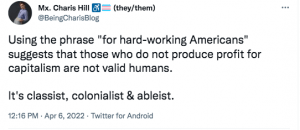![[Alt-text]: Screenshot of a tweet by Elizabeth Flux, reading: “I always thought the apocalypse would be fast but instead it’s all like ‘dear diary, it’s saturday, year three of the end times, anyway time to go to work as usual’”](https://web.sas.upenn.edu/earlyamericanstudies/files/2022/04/Pawlicki_1-Sarah-Pawlicki.png)
The above tweet made me chuckle from my kitchen table, where I’m working from home through the Omicron surge. It’s true that, regardless of COVID-19, I’m still as worried about producing dissertation chapters, syllabi, case studies, and grant applications as ever.
Despite significant differences in place, time, and culture, the abovementioned figurative journal entry lamenting the daily grind of the apocalypse would probably have also resonated with a Puritan hauling logs to a sawmill, planting springtime crops, or mending a basket of clothes. Was the apocalypse imminent? Possibly. Did only God’s grace stand between life and eternal death? Certainly. However, apocalypses weren’t reasons not to work; indeed, quite the contrary.1
Belief in an impending Day of Judgment encouraged Puritans to work since the performance of particular kinds of labor could serve as evidence of the Christian God’s approving presence. From spinning thread to breaking soil, labor in this world was tentatively correlated with one’s fate in the next. This made daily labor part of what Puritans called “sanctification,” the doing of saintly works. A person’s sanctification was circumstantial evidence of “justification” – God’s forgiveness of sin.
![[Alt-text]: Tan cover page of The Soul’s Preparation for Christ. Or, a Treatise of Contrition. Wherein is discovered How God breaks the heart and wounds the Soul, in the conversion of a Sinner to Himself, by Thomas Hooker.](https://web.sas.upenn.edu/earlyamericanstudies/files/2022/04/EAS-Miscellany_Pawlicki_2.png)
In seventeenth-century New England, the sin of idleness cast individuals who didn’t participate in labor systems infused with Puritan values as suspiciously outside the community of so-called “visible saints.” The United States’ pandemic response demonstrates how people marginalized by capitalist definitions of productive labor still continue to be devalued as individuals with intrinsic worth and deprioritized as integral members of our communities.
Ideas about disability, labor, and value were—and are—profoundly intertwined. In Keywords for Disability Studies, scholar Sarah Rose observes that, “In many cultures, disability has been characterized as the inability to do productive labor, a charge that has limited the citizenship and social standing of people with disabilities.”3 This ableist bias pervades pandemic response in the United States, as getting people “back to work” is a message underlying the oft repeated cliché of “getting back to normal.”
Journalist and disability rights activist Marta Russell writes, “If work defines human worth and work is the central criterion for human validation, then the worker has their pride and the capitalist has their labor to exploit, two sides of the same paradigm. If work was to be the end-all of existence, then disabled people (who could not work) inevitably would be marginalized, and relegated to a corner of society.”4 The marginalization Russell predicted now plays out on the 24-hour news cycle, as the needs of the most vulnerable in the wake of the pandemic are sidelined in favor of ensuring the cycle of production, exploitation, and consumerism continues uninterrupted.5
If participation in specific forms of culturally sanctioned labor is considered a necessary criterion to enter—perhaps not the community of “visible saints” as in the Puritan ethic—but the modern civic community of full and valued citizenship, who is excluded? What types of labor are recognized as valid, providing a figurative passport into this imagined community? Does care work count? Does sex work count? Does “unskilled” labor count? Too often, the answer to these questions is a resounding “no.”

When particular forms of labor are used as evidence of belonging in a community—of saints or citizens—people marginalized by high expectations of labor are excluded. People who more fully fit into expected standards of labor find themselves worrying about their supposedly “declining productivity” even in, as Elizabeth Flux observes, “year three of the end times.” In fact, anxiety about the so-called “end times” motivates many of us to drive ourselves harder, using labor as a way to cope, to make sense of this chaos, to keep ourselves afloat. In place of a work ethic defined by apocalypticism, I find myself dwelling on words written by Anishinaabe poet and theorist Leanne Betasamosake Simpson: “I think that the impetus to act and to change and to transform, for me, exists whether or not this is the end of the world. If a river is threatened, it’s the end of the world for those fish.”6

Sarah Pawlicki is a PhD candidate in History at the University of Minnesota, with graduate minors in Heritage Studies and Public History and Native American and Indigenous Studies. Sarah is a founding member of the public history collective REPAIR (Rethinking Equity in Place-based Activism, Interpretation, and Renewal), which in Fall, 2021 led a cross-institutional course called Disability Justice and Cultural Heritage.
My Twitter handle is skpawlicki, and my pronouns are she/they.
- Sarah Pawlicki, “‘I Hear that God Saith Work’: Wunnampuhtogig and Puritans Laboring for Grace in Massachusetts, 1643-1653,” Early American Studies 20, no. 2 (Spring, 2022). ↩
- Max Weber, The Protestant Ethic and the Spirit of Capitalism, trans. Stephen Kalberg (Los Angeles: Roxbury Publishing Company, 1996), 123. ↩
- Sarah F. Rose, “Work,” in Keywords for Disability Studies, ed. Rachel Adams, Benjamin Reiss, and David Serlin (New York: NYU Press, 2015), 187. ↩
- Marta Russell, “Eugenics and the ‘Sole Possible Economic Order,’” in Capitalism & Disability, ed. Keith Rosenthal (Chicago: Haymarket Books, 2019), 167. ↩
- Mia Mingus, “You are Not Entitled to Our Deaths: COVID, Abled Supremacy & Interdependence,” Leaving Evidence, January 16, 2022, https://leavingevidence.wordpress.com/2022/01/16/you-are-not-entitled-to-our-deaths-covid-abled-supremacy-interdependence/; Imani Barbarin, “Death by a Thousand Words: COVID-19 and the Pandemic of Ableist Media,” Refinery 29, August 30, 2021, https://www.refinery29.com/en-us/2021/08/10645352/covid-19-and-the-pandemic-of-ableist-media. ↩
- Leanne Betasamosake Simpson, As We Have Always Done: Indigenous Freedom through Radical Resistance (Minneapolis: University of Minnesota Press, 2017), 74. ↩
